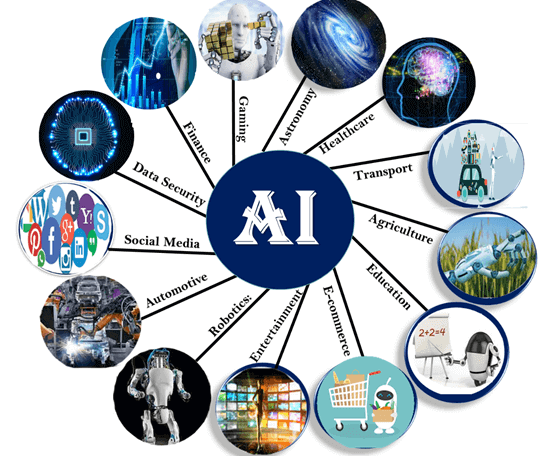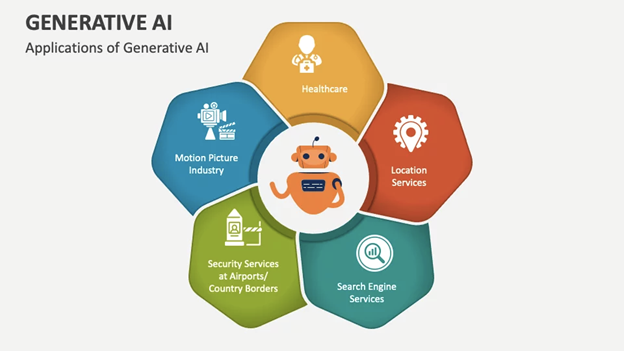The explosion of digital uncertainty
Relevance
- GS Paper 3 IT & Computers, Scientific Innovations & Discoveries,Artificial Intelligence.
- Tags: #Generative AI – Benefits, Threats, #Generative Artificial Intelligence (AI).
Why in the news?
Recent advances in Generative Artificial Intelligence (AI) have captured the imagination of the public, businesses, and governments alike. The Government of India has also, very recently, released a comprehensive report on the opportunities afforded by this current wave of AI.
Artificial Intelligence (AI)
- Artificial intelligence (AI) is the intelligence of machines or software, as opposed to the intelligence of humans or animals. It is also the field of study in computer science that develops and studies intelligent machines. “AI” may also refer to the machines themselves.
Types of AI
- Traditional AI, often called Narrow or Weak AI, focuses on performing a specific task intelligently. These systems have the capability to learn from data and make decisions or predictions based on that data.
- Generative AI, on the other hand, can be thought of as the next generation of artificial intelligence. It’s a form of AI that can create something new.
The emergence of AGI
- The emergence of Artificial General Intelligence (AGI) — Artificial Intelligence that is equal and or superior to human intelligence, which will penetrate whole new sectors and replace human judgement, intuition and creativity.
Benefits of Generative AI
- Content Creation: Generative AI enables the automated creation of various types of content, such as text, images, videos, music, and more. This can significantly speed up the content generation process for industries like advertising, entertainment, and marketing.
- Personalization: Generative AI can be used to create personalized experiences for users. By analyzing user preferences and behavior, generative AI systems can generate tailored recommendations, product suggestions, and customized content, enhancing customer satisfaction and engagement.
- Creative Assistance: Generative AI tools can assist and inspire creative professionals in their work. Artists, designers, and writers can use generative AI to generate ideas, explore new possibilities, and overcome creative blocks. It can act as a collaborator, offering fresh perspectives and aiding in the creative process.
- Data Augmentation: Generative AI can generate synthetic data that closely resembles real data. This is particularly useful in machine learning applications where a large amount of labelled data is required. Synthetic data can be generated to augment existing datasets, helping improve the performance and generalization of machine learning models.
- Simulation and Training: Generative AI can be used to simulate realistic scenarios for training purposes. For example, in industries like autonomous vehicles or robotics, generative AI can create virtual environments to train algorithms and test systems without the need for physical resources or risking safety.
- Problem Solving: Generative AI can be applied to problem-solving tasks, such as generating new drug compounds, optimizing supply chain logistics, or creating efficient designs. By exploring vast solution spaces, generative AI algorithms can propose novel solutions and accelerate the discovery process.
- Virtual Characters and Agents: Generative AI can bring virtual characters and agents to life. By imbuing them with generative capabilities, they can exhibit natural language understanding, interact with users, and respond dynamically to different situations. This has applications in virtual assistants, chatbots, gaming, virtual reality, and more.
- Art and Entertainment: Generative AI has opened up new avenues for artistic expression. It can generate unique artwork, compose music, produce realistic animations, and even generate entire stories or scripts. This fusion of human creativity and machine intelligence has led to exciting possibilities in the realm of art and entertainment.
Challenges of AGI
- Social and economic inequalities will rise exponentially.
- It has an inherent capacity to flood a country with fake content masquerading as truth, and for imitating known voices with false ones that sound eerily familiar.
- AGI will enable highly autonomous systems that outperform humans in many areas, including economically (valuable) work, education, social welfare and the like.
- It is almost certain to lead to material shifts in the geopolitical balance of power, and in a way never comprehended previously.
- The spectre of digital colonization looms large with AGI- based power centres being based in a few specific locations.
- Consequently, AGI-driven disruption could precipitate the dawn of the age of digital colonialism. This would lead to a new form of exploitation, viz., data exploitation.
India Harness the Benefits of Generative AI
- Healthcare: Generative AI can help diagnose and treat diseases more accurately by analyzing medical images and data. It can also help predict patient outcomes and take preventive measures.
- Education: Generative AI can help create personalized learning content and assessments for students based on their abilities and interests. It can also help teachers with grading, feedback, and curriculum design.
- Agriculture: Generative AI can help optimize crop yield and quality by generating recommendations for irrigation, fertilization, pest control, and harvesting based on weather, soil, and plant data.
- Manufacturing: Generative AI can help design and produce new products and services that meet customer needs and preferences by analyzing market trends and consumer behavior. It can also help improve efficiency and quality control in production processes.
- Entertainment: Generative AI can help create new forms of art, music, literature, and games that can entertain and inspire people. It can also help personalize content recommendations and advertisements based on user preferences.
Conclusion
Generative AI is a powerful and promising technology that can bring many benefits to India and its people. However, it also poses many challenges and risks that need to be addressed by effective and responsible regulation. India should adopt a proactive and balanced approach to generative AI implementation that ensures its safety, security, and ethical use.
Source: The Hindu
Mains Question
Discuss the potential benefits and challenges of generative AI for India’s development and security. Suggest some measures that India should take to harness the opportunities and mitigate the risks of generative AI.






